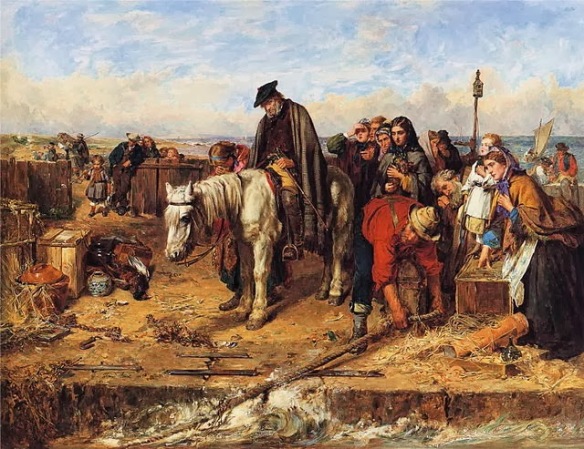
After the Jacobites’ catastrophic defeat at Culloden, Lord George Murray rallied the shattered remnants of his forces, falling back through Balvraid to the Ford of Faillie, which the Prince had crossed a little earlier. There he met Aeneas MacDonald, who had stayed behind with money from the Prince in the form of 500 Spanish pistoles (a gold coin worth slightly less that a pound sterling), which he gave to Murray to pay his followers. Murray and the other survivors then moved on, sleeping out that night near Loch Moy, before being joined there, the morning after the battle, by 300-400 clansmen from Badenoch, under MacPherson of Cluny. Worried about a surprise attack by the Grants, Murray ordered them to act as a rearguard as the defeated army marched south-west along Strathspey on the Prince’s instructions, making for Ruthven in Badenoch.
Next day, Murray was outraged to receive a demand from the Prince for the return of the Spanish pistoles. Burning with indignation `that the Prince carries away the money while so many gentlemen who have sacrificed their fortunes for him are starving’, Murray gave vent to his frustrations in a long letter, castigating the Prince and resigning his commission. This outburst seems merely to have stoked the Prince’s suspicions of his former commander-in-chief to the point of paranoia.
By 20 April, what remained of the Jacobite rank and file had mustered at Ruthven along with many of their officers – probably a total of just 1,500 men. This disregards the over-optimistic estimate given by the Chevalier de Johnstone that there were
4,000 or 5,000 Highlanders, all in the best disposition possible for renewing the contest, and having their revenge . . . breathing with impatience for the moment to be led back to the enemy . . . Everyone beseeched the Prince most earnestly to come thither quickly to put himself at their head.
Elcho and Lovat had put the option of further military action to Charles at Gortuleg but, by then, he had taken the advice of Sheridan and O’Sullivan to try to escape to the Continent. If the Scots had failed him, the French would surely help him with yet another army. He must have known for certain that the war-weary French had already discounted any further armed support but he chose to totally ignore that.
There are widely varying accounts of the dismissal of the Jacobite forces at Ruthven: Lord Elcho, who was with the Prince, claimed that the men were told on the way there to `disperse and everybody shift for himself as best he could’; Andrew Lumisden, who was at Ruthven, stated that the Prince eventually sent a message of thanks to his followers for their bravery and devotion, advising them `to do what they thought was best for their own preservation, till a more favourable opportunity of acting presented itself ‘; the Chevalier de Johnstone’s version was that, in response to a message from Murray, the Prince sent the well-known, laconic reply: `Let everyone seek the means of escape as well as he can’; while Ker of Graden claimed that the Prince did not bother to reply, so that the army just dispersed after waiting a few days.
Yet another account has the Prince behaving much less honourably, getting his aide-de-camp to write to Cluny on the evening after the battle:
We are to review tomorrow at Fort Augustus, the Frasers, Camerons, Stewarts, Clanranald’s and Keppoch’s people. His Royal Highness expects your people [the MacPhersons] will be with us at furthest Friday morning [18 April]. Dispatch is the more necessary that His Highness has something in view which will make ample amends for this day’s ruffle [at Culloden].
Since the bearer of the letter let slip that Charles was, at that moment, heading along the Great Glen in the opposite direction to Fort Augustus, this version of events suggests that he was trying to use his followers as decoys in order to deceive Cumberland about his own whereabouts.
Cumberland now made Inverness his headquarters for the next five weeks. Orders were given that the Jacobite leaders were to be detained, while the ordinary Highlanders still in arms were required to surrender their weapons on pain of execution. They would then be issued with certificates, allowing them to `return unmolested to their homes until his Majesty’s pleasure is known’. Nevertheless, Lochiel, along with Stewart of Ardshiel and Cluny, tried to maintain the momentum of the Rebellion, calling a meeting at Murlaggan near the head of Loch Arkaig in late April. It was attended by Lovat, MacDonald of Barisdale, MacDonald of Lochgarry, Glenbucket and John Roy Stewart and several others. Ranald MacDonald, younger of Clanranald, was absent, having returned home severely wounded after Culloden. They all agreed to muster under arms a week later for a summer campaign of guerrilla warfare against Cumberland’s forces but had to abandon their plans after a poor response. Instead, they were threatened by Cumberland, who by then controlled the Great Glen.
Their threat of further insurrection must have finally convinced Cumberland, if he needed any convincing, that only a savage policy of widespread repression would end the 1745 Rebellion, especially while the Prince still remained at large. By refusing to accept the inevitable after such a decisive defeat at Culloden, the chiefs of the Jacobite clans had merely made a desperate situation far worse for themselves and, more especially, for their clansmen.